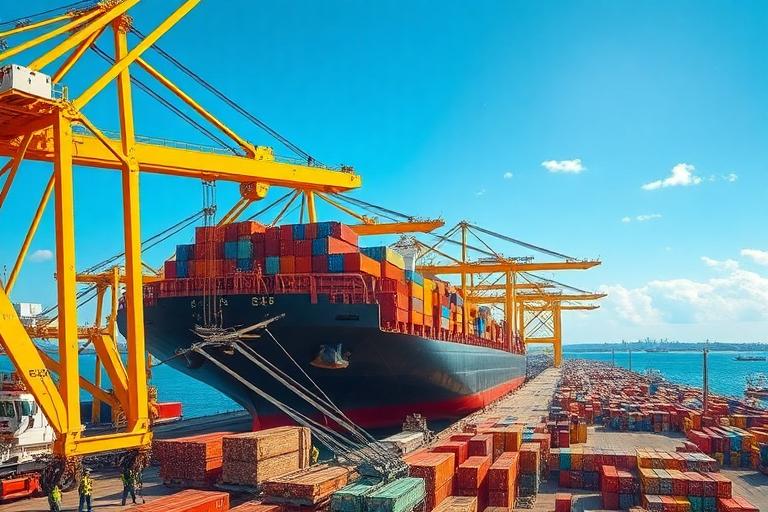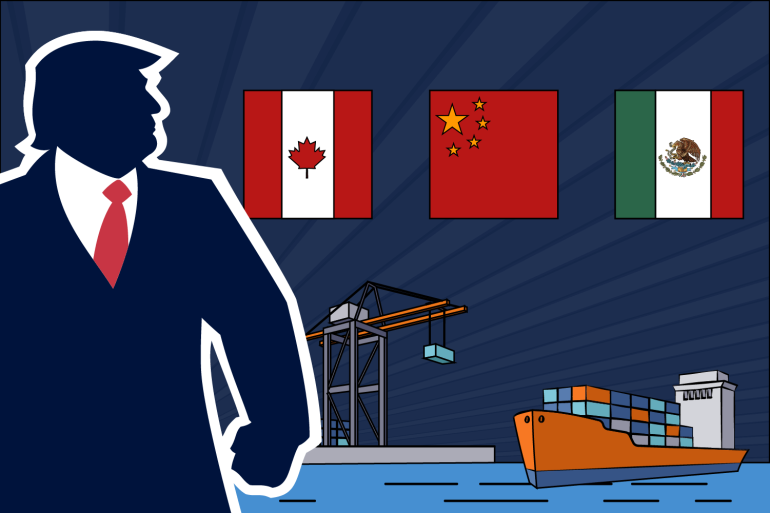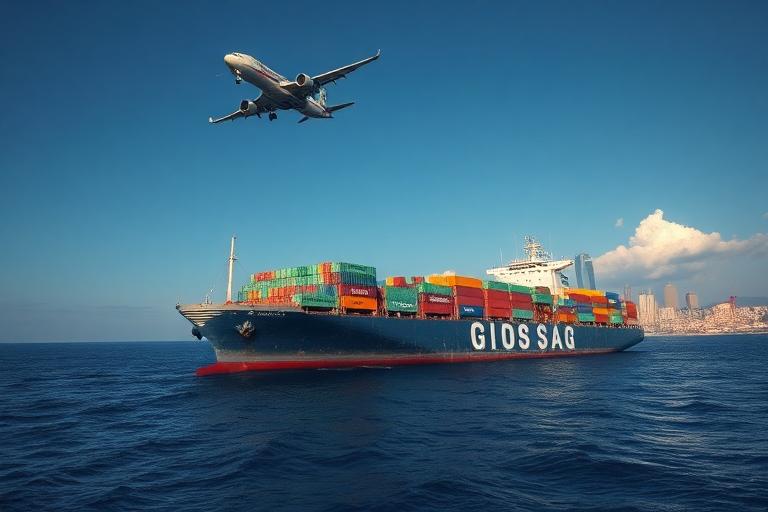Are you considering how to efficiently transport goods to Australia? Understanding Breakbulk Freight Forwarding is crucial for navigating the complexities of international shipping. In this article, we will explore the essentials of using a Breakbulk Freight Forwarder, from its significance to key benefits and the qualities to look for in a reliable partner. Join us as we dive into the critical aspects of evaluating and selecting the right freight forwarder to ensure a seamless shipping experience to Australia.

Understanding Breakbulk Freight Forwarding to Australia
What is Breakbulk Freight and Why It Matters
Breakbulk freight refers to large, heavy items that must be loaded individually, as opposed to being transported in containers or bulk. This can include machinery, vehicles, or oversized equipment, which require special handling, transportation, and logistics. Understanding the intricacies of breakbulk shipping is crucial for businesses looking to import goods to Australia, as it involves additional considerations compared to standard freight.
The significance of breakbulk freight lies in its necessity for industries such as construction, mining, and manufacturing. These sectors often require the import of large-scale equipment and materials that are not suitable for container shipping. The breakbulk shipping process entails meticulous planning and execution, ensuring that all regulatory requirements are met and that the cargo arrives safely and on time. Moreover, it plays a vital role in supplying the infrastructure required for Australia’s growing economy.
Key Benefits of Using a Breakbulk Freight Forwarder
Utilizing a specialized breakbulk freight forwarder offers several advantages, especially when navigating the complexities of importing to Australia:
Expertise in Handling Oversized Cargo: A reliable breakbulk freight forwarder possesses the knowledge and skills to manage large and heavy shipments. They are familiar with the necessary equipment, handling techniques, and packaging requirements, which minimizes the risk of damage during transit.
Compliance with Regulations: Australia has stringent customs and import regulations. A professional freight forwarder can ensure compliance with these regulations, including obtaining the required permits and documentation, thus preventing costly delays.
Cost Efficiency: By leveraging their industry connections and negotiating shipping rates, a breakbulk freight forwarder can help businesses reduce overall shipping costs. They can also provide insights into the most efficient routes and modes of transport, optimizing logistics.
Risk Management: Freight forwarders often provide insurance options for breakbulk shipments, safeguarding against potential losses due to damage or delays. This added layer of protection is crucial for businesses relying on timely delivery.
Comprehensive Logistic Solutions: Many freight forwarders offer a range of services, including customs clearance, warehousing, and door-to-door delivery. This one-stop service significantly simplifies the logistics process for businesses, allowing them to focus on their core operations.
Read More:
- Shipping From China to Australia
- Shipping From China to New Zealand
- Shipping From China to Papua New Guinea
- Shipping From China to Fiji
- Shipping From China to Solomon Islands
- Shipping From China to Vanuatu
Choosing the Right Breakbulk Freight Forwarder for Australia
Essential Qualities of a Reliable Breakbulk Freight Forwarder
When selecting a breakbulk freight forwarder for your logistics needs to Australia, it is vital to consider certain key qualities:
Experience and Track Record: Look for a freight forwarder with extensive experience in handling breakbulk shipments. A proven track record can indicate reliability and expertise in managing complex logistics.
Strong Network: A reputable forwarder will have established relationships with carriers, ports, and customs brokers, facilitating smoother operations and potentially reducing costs.
Transparent Communication: Effective communication is crucial in freight forwarding. A professional forwarder should provide clear updates throughout the shipping process, ensuring that you are informed at all stages.
Safety and Security Measures: The freight forwarder should implement stringent safety protocols to protect your cargo during loading, transport, and unloading, minimizing the risk of damage.
Tailored Solutions: Every shipment is unique, particularly in breakbulk freight. A good forwarder will offer customized solutions that cater to your specific needs, including tailored packing, handling, and transport options.
Industry Experience and Expertise in Australian Regulations
Navigating Australian customs and import regulations can be complex, which is why selecting a freight forwarder with specialized knowledge in this area is paramount. The ideal forwarder should possess:
Knowledge of Australian Import Laws: They should be well-versed in the legal requirements for importing breakbulk goods into Australia, including tariffs, documentation, and inspections.
Experience with Local Port Operations: Familiarity with Australian ports, such as Port of Sydney, Port of Melbourne, and Port of Brisbane, and their operational nuances can significantly streamline the shipping process.
Problem-Solving Skills: Should issues arise during shipping, a forwarder with experience in dealing with customs challenges, logistical hurdles, or unexpected delays will be invaluable.
By ensuring your breakbulk freight forwarder has these qualities and expertise, you can create a solid foundation for successful logistics operations between your business and Australia. At Dantful International Logistics, we pride ourselves on being a highly professional, cost-effective, and high-quality one-stop international logistics service provider for global traders. We specialize in breakbulk freight forwarding to Australia, ensuring that your oversized shipments are handled with the utmost care and efficiency.
Researching Breakbulk Freight Forwarders
Top Platforms and Resources for Finding Freight Forwarders
When it comes to sourcing a reliable breakbulk freight forwarder to Australia, leveraging the right platforms and resources can significantly streamline your efforts. Here are some key resources where you can find reputable freight forwarders:
Freight Forwarding Directories: Websites like Freightos, Freight Forwarder Network, and World Freight Network provide comprehensive listings of freight forwarders based on their specialties, including breakbulk shipping. These directories often include customer reviews and ratings, enabling you to gauge service quality.
Logistics Trade Shows and Conferences: Attending industry events such as the Australian International Freight Forwarders Association (AIFAA) conferences or Multimodal Logistics Events can be invaluable. These events allow you to network face-to-face with freight forwarders, understand their services, and discuss your specific needs.
Social Media and Professional Networks: Platforms like LinkedIn are great for connecting with industry professionals. You can search for freight forwarders specializing in breakbulk shipping and read through endorsements and recommendations from other professionals in your network.
Freight Exchange Platforms: Utilizing platforms like Loadshift and FreightMatch can help you find freight forwarders that specialize in breakbulk transport. These platforms often allow you to post your shipment needs and receive proposals from multiple forwarders.
Online Marketplaces and Referral Services: Websites such as Alibaba and Global Sources can also serve as platforms to find freight forwarders who specialize in breakbulk shipping. Additionally, platforms like Trustpilot and Yelp provide reviews that can help inform your decision.
By utilizing these platforms effectively, you can compile a list of potential breakbulk freight forwarders to Australia, allowing for an informed selection based on your unique shipping requirements.
Leveraging Industry Connections for Recommendations
One of the most effective ways to find a trustworthy breakbulk freight forwarder is through recommendations from industry connections. Here’s how to leverage these valuable resources:
Networking with Industry Peers: Engaging with your contacts in the logistics and shipping sector can yield strong recommendations. Colleagues who have experience with Australian freight forwarding can provide insights into their trusted partners or negative experiences to avoid.
Industry Associations: Membership in logistic and shipping associations, such as the Australian Logistics Council (ALC) or Transport and Logistics Australia (TLA), can connect you to an extensive network of professionals. These associations often have resources to help members find reputable freight forwarders.
Consulting with Trade Groups: Consider reaching out to local chambers of commerce or trade groups that focus on international trade. These organizations frequently have connections with reliable freight forwarders and can offer recommendations tailored to your specific needs.
Online Forums and Communities: Participating in online forums related to shipping and logistics, such as Reddit’s r/logistics or specialized Facebook groups, can provide firsthand accounts and suggestions from individuals who have navigated similar shipping challenges.
By leveraging these industry connections, you can gain valuable insights into the capabilities, reliability, and pricing of various breakbulk freight forwarders to Australia, ensuring you make a well-informed choice.
Evaluating the Capabilities of Breakbulk Freight Forwarders
Assessing Equipment and Handling Expertise
When evaluating the capabilities of potential breakbulk freight forwarders, it is crucial to assess their equipment and handling expertise. Here are some key considerations:
Specialized Equipment: Ensure that the freight forwarder has the necessary equipment for handling oversized and heavy cargo. This includes cranes, flatbed trucks, and specialized containers designed for breakbulk shipments. A forwarder with adequate equipment can significantly reduce the risk of damage during transit.
Handling Expertise: Evaluate the forwarder’s experience and expertise in managing breakbulk cargo. Ask about their past projects and request case studies that demonstrate their ability to handle similar shipments. Their familiarity with loading, unloading, and securing breakbulk cargo is essential for a successful shipping experience.
Operational Capacity: Inquire about the forwarder’s operational capacity, including their network of partners and subcontractors. A well-established forwarder should have connections with port authorities, customs brokers, and local logistics providers in Australia, facilitating smoother operations.
Risk Management Strategies: Discuss their risk management strategies to ensure that your cargo is less likely to encounter issues during the shipping process. Effective risk management practices are imperative for handling breakbulk shipments, which often come with unique challenges.
Importance of Certifications and Compliance
Certifications and compliance are paramount when choosing a breakbulk freight forwarder. Here’s why they matter:
Regulatory Compliance: Ensure that the freight forwarder complies with all relevant Australian regulations and international shipping standards. This includes adherence to Customs regulations, import/export laws, and safety standards. Forwarders must be knowledgeable about the regulatory landscape to avoid costly delays or penalties.
Certifications and Memberships: Check if the freight forwarder holds certifications from recognized industry bodies such as the International Federation of Freight Forwarders Associations (FIATA) or Customs Brokers and Forwarders Council of Australia (CBFCA). These certifications indicate a commitment to industry best practices and professionalism.
Insurance and Liability Coverage: It is essential that the forwarder has adequate insurance coverage for breakbulk shipments. Inquire about their liability coverage and policies on loss or damage to cargo, as this can protect your investment during transit.
Sustainability Practices: Increasingly, businesses are looking for forwarders who prioritize sustainability in their operations. Ask about the forwarder’s commitment to eco-friendly practices, which can enhance your brand reputation and meet consumer expectations for environmental responsibility.
By assessing these factors, you can ensure that your chosen breakbulk freight forwarder is equipped to handle your shipments with expertise and reliability, leading to a successful logistics partnership.
Communicating Effectively with Your Freight Forwarder
Key Information to Provide About Your Cargo
Effective communication is pivotal when working with a breakbulk freight forwarder to Australia. Providing comprehensive and precise information about your cargo ensures that the freight forwarder can offer you the best service tailored to your needs. Here are some critical details you should share:
Cargo Description: Offer a detailed description of the goods, including size, weight, and dimensions. This information is crucial for proper handling and transportation planning.
Special Handling Requirements: If your cargo requires special handling due to its nature (e.g., fragile items, hazardous materials), make sure to inform your freight forwarder upfront.
Loading and Unloading Locations: Specify the exact locations for both loading and unloading. Clarity on the pick-up and delivery points can help avoid unforeseen delays.
Shipping Timeline: Communicate your expected shipping schedule. Understanding your timeline will allow the freight forwarder to devise the most efficient transportation plan.
Customs Documentation: If any special documentation is required for customs clearance in Australia, ensure that your freight forwarder is aware. Providing necessary paperwork in advance can expedite the process.
By ensuring your freight forwarder has all relevant information, you can facilitate smoother logistics and a more transparent shipping process.
Questions to Ask Your Breakbulk Freight Forwarder
When engaging with a breakbulk freight forwarder, it’s essential to ask the right questions to ensure they are capable of meeting your needs. Here are some key inquiries:
What is your experience with breakbulk shipments to Australia? – Understanding their experience with similar shipments can provide insight into their capability and reliability.
What handling equipment do you utilize for breakbulk freight? – Ask about the type of equipment and technology they have at their disposal, as this can affect the safety and efficiency of your cargo’s transport.
Can you provide references from previous clients? – References can help gauge the forwarder’s reputation and service quality.
What are your insurance options for breakbulk cargo? – Discuss available insurance policies to protect your assets during transit.
What are your protocols for managing delays or damaged cargo? – Understanding their contingency plans can provide peace of mind should issues arise during transportation.
By posing these questions, you can assess the capabilities of the freight forwarder and make a well-informed decision.
Analyzing Costs and Services of Breakbulk Freight Forwarders
Common Pricing Models for Breakbulk Shipping
Understanding the pricing models used by breakbulk freight forwarders is vital for budgeting your shipping costs. Here are some common pricing structures:
Per Weight: Charges based on the weight of the cargo. Typically used when the weight is a significant factor in transportation efficiency.
Per Volume: Costs are calculated based on the cubic meters (CBM) occupied by the cargo. This model is often used for larger shipments where volume is more relevant than weight.
Flat Rate: A fixed cost for shipping regardless of weight or volume. This can simplify budgeting but may not always reflect the actual transportation costs.
Additional Fees: Be aware of potential surcharges including loading/unloading fees, port fees, and customs handling charges. Discuss these upfront to avoid surprises later.
Finalizing Your Partnership with a Breakbulk Freight Forwarder
Important Contractual Terms and Conditions
Finalizing a partnership with a breakbulk freight forwarder necessitates careful consideration of the contractual terms and conditions. Key elements to review include:
Scope of Services: Clearly define what services will be provided, including all aspects of transportation, handling, and customs clearance.
Pricing and Payment Terms: Agree upon pricing structures and payment timelines to prevent disputes.
Liability Clauses: Understand the forwarder’s liability in the event of loss or damage to your cargo. Ensure you are aware of any limitations on claims.
Termination Conditions: Know the terms under which either party can terminate the agreement, including any notice period required.
Ensuring Clear Logistics and Communication Channels
To maintain a healthy working relationship with your breakbulk freight forwarder, establishing clear logistics and communication channels is essential. Here are some strategies:
Regular Updates: Set expectations for regular status updates throughout the shipping process, so both parties remain informed.
Dedicated Contact Person: Assign a single point of contact for all communications to streamline information flow and avoid confusion.
Use of Technology: Leverage tracking and logistics software provided by your freight forwarder to monitor shipments in real-time.
Feedback Mechanism: Implement a system for providing feedback on services rendered, facilitating continuous improvement in the partnership.
By following these guidelines, you can forge a successful and efficient partnership with your breakbulk freight forwarder, ensuring that your shipments to Australia are handled seamlessly. For those seeking a reliable partner, Dantful International Logistics offers a comprehensive suite of services designed to meet your breakbulk shipping needs with professionalism and efficiency.

Young Chiu is a seasoned logistics expert with over 15 years of experience in international freight forwarding and supply chain management. As CEO of Dantful International Logistics, Young is dedicated to providing valuable insights and practical advice to businesses navigating the complexities of global shipping.





















 Afrikaans
Afrikaans Shqip
Shqip አማርኛ
አማርኛ العربية
العربية Հայերեն
Հայերեն Azərbaycan dili
Azərbaycan dili Euskara
Euskara Беларуская мова
Беларуская мова বাংলা
বাংলা Bosanski
Bosanski Български
Български Català
Català Cebuano
Cebuano Chichewa
Chichewa 简体中文
简体中文 繁體中文
繁體中文 Corsu
Corsu Hrvatski
Hrvatski Čeština
Čeština Dansk
Dansk Nederlands
Nederlands English
English Esperanto
Esperanto Eesti
Eesti Filipino
Filipino Suomi
Suomi Français
Français Galego
Galego ქართული
ქართული Deutsch
Deutsch Ελληνικά
Ελληνικά Kreyol ayisyen
Kreyol ayisyen Harshen Hausa
Harshen Hausa Ōlelo Hawaiʻi
Ōlelo Hawaiʻi עִבְרִית
עִבְרִית हिन्दी
हिन्दी Hmong
Hmong Magyar
Magyar Íslenska
Íslenska Igbo
Igbo Bahasa Indonesia
Bahasa Indonesia Gaeilge
Gaeilge Italiano
Italiano 日本語
日本語 Basa Jawa
Basa Jawa ಕನ್ನಡ
ಕನ್ನಡ Қазақ тілі
Қазақ тілі ភាសាខ្មែរ
ភាសាខ្មែរ 한국어
한국어 كوردی
كوردی Кыргызча
Кыргызча ພາສາລາວ
ພາສາລາວ Latin
Latin Latviešu valoda
Latviešu valoda Lietuvių kalba
Lietuvių kalba Lëtzebuergesch
Lëtzebuergesch Македонски јазик
Македонски јазик Malagasy
Malagasy Bahasa Melayu
Bahasa Melayu മലയാളം
മലയാളം Maltese
Maltese Te Reo Māori
Te Reo Māori मराठी
मराठी Монгол
Монгол ဗမာစာ
ဗမာစာ नेपाली
नेपाली Norsk bokmål
Norsk bokmål پښتو
پښتو فارسی
فارسی Polski
Polski Português
Português ਪੰਜਾਬੀ
ਪੰਜਾਬੀ Română
Română Русский
Русский Samoan
Samoan Gàidhlig
Gàidhlig Српски језик
Српски језик Sesotho
Sesotho Shona
Shona سنڌي
سنڌي සිංහල
සිංහල Slovenčina
Slovenčina Slovenščina
Slovenščina Afsoomaali
Afsoomaali Español
Español Basa Sunda
Basa Sunda Kiswahili
Kiswahili Svenska
Svenska Тоҷикӣ
Тоҷикӣ தமிழ்
தமிழ் తెలుగు
తెలుగు ไทย
ไทย Türkçe
Türkçe Українська
Українська اردو
اردو O‘zbekcha
O‘zbekcha Tiếng Việt
Tiếng Việt Cymraeg
Cymraeg יידיש
יידיש Yorùbá
Yorùbá Zulu
Zulu